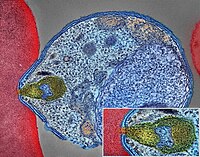
Photo from wikipedia
The laboratory diagnosis of malaria depends on skilled examination of well‐stained thick and thin blood films. Rapid diagnostic tests are a useful supplement and the use of nucleic acid‐based testing… Click to show full abstract
The laboratory diagnosis of malaria depends on skilled examination of well‐stained thick and thin blood films. Rapid diagnostic tests are a useful supplement and the use of nucleic acid‐based testing in diagnostic laboratories should also be considered. These British Society for Haematology guidelines update the 2003 guidelines for malaria diagnosis. Training, quality control, incidental diagnosis, differential diagnosis and reference laboratory referral are considered.
Journal Title: British Journal of Haematology
Year Published: 2022
Link to full text (if available)
Share on Social Media: Sign Up to like & get
recommendations!